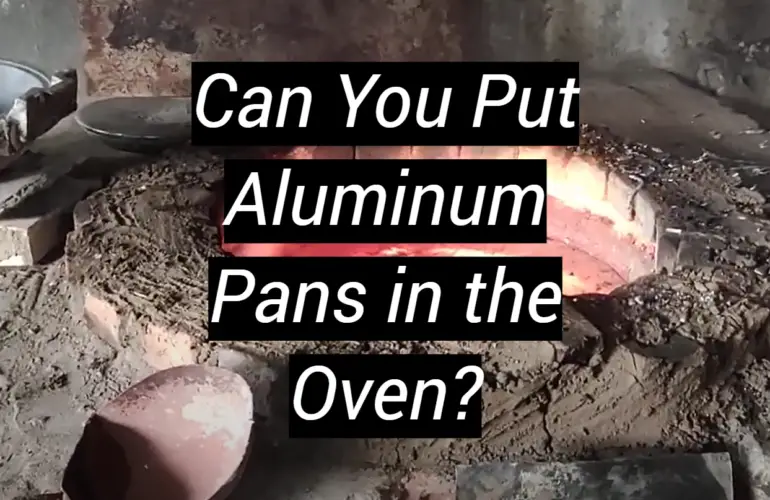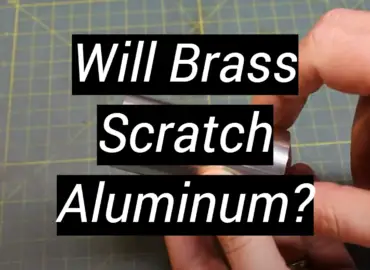Do you ever hesitate to use an aluminum pan for baking in the oven, even if the recipe calls for it? It’s an all too common dilemma — can you really put aluminum frying pans in the oven? While we may hesitate due to safety and health concerns, it turns out using this type of cookware isn’t anything to worry about.
In fact, not only is it considered safe but there are several potential benefits when compared to other traditional materials like glass and ceramic. Read on for everything you need to know about the best way to safely use aluminum pans in your own kitchen!
Why Choose Aluminum for Cooking?
The cooking process always implies a careful approach not only in the choice of products, but also in the selection of equipment for it. You always want to pick the best quality, environmentally friendly and safe solutions for your health.
It also has excellent heat conductivity, meaning it transfers heat quickly and evenly throughout the pan. This helps to ensure that food cooks uniformly and prevents food from burning or sticking to the bottom.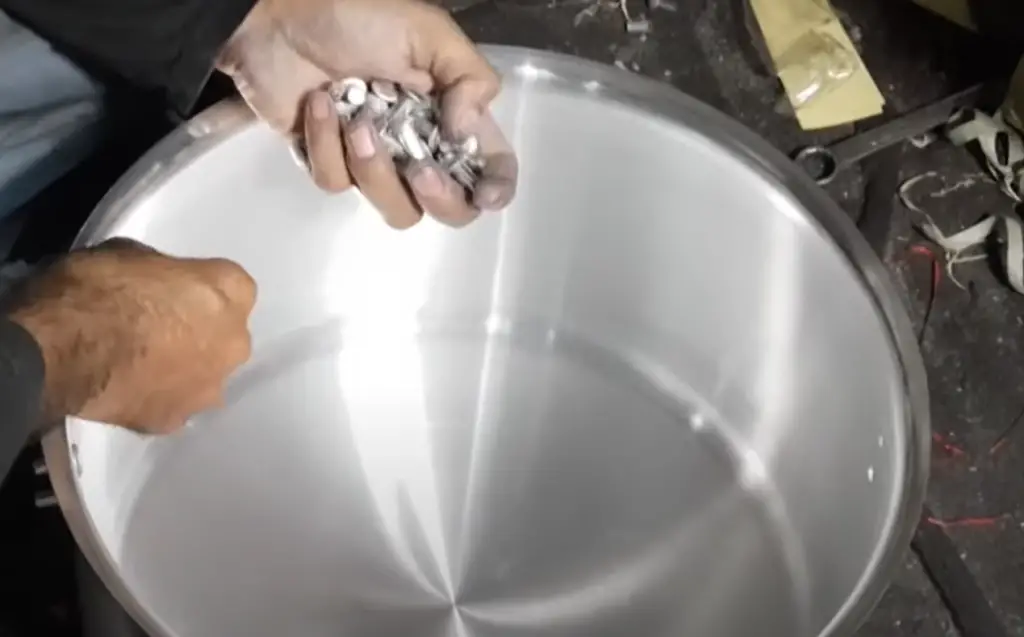
Aluminum is low-maintenance and easy to clean, making it an ideal material for everyday cooking needs. This material is non-porous, so bacteria and other impurities cannot penetrate it, making it a healthy choice of cookware. Plus, aluminum pans come in many shapes and sizes to fit all your cooking needs. [1]
So when you’re looking for an oven-safe pan for baking or roasting, an aluminum pan is a great option. With the right care and maintenance, these pans can last for years with minimal wear and tear. Just remember to always read the manufacturer’s instructions carefully before putting an aluminum pan in the oven—or any type of cookware for that matter!
What Type of Aluminum Pans to Choose for the Oven?
There are regular and aluminum-clad pans. Aluminum-clad pans have a core of stainless steel or copper, covered in aluminum, while regular aluminum is made of solid aluminum. The last ones are more affordable but can easily warp if exposed to high temperatures for extended periods. If you’re planning on using your pan in the oven regularly, it might be worth investing in a good quality piece that won’t deform over time. It’s also important to note that whatever type of pan you choose should always be placed onto a baking sheet before putting it into the oven—this will help protect both your oven and your cookware.
Aluminum frying pans can also be divided into:
- The stamped pan is extremely lightweight. This is due to the technology of its manufacture: the pan is formed with a special stamp after bending sheets of pure aluminum. Due to this, the walls and bottom of such a frying pan are of the same thickness. Stamped pans are more suitable for heating food than for cooking complex dishes. The reason for this is that such pans are very thin and food can burn or not be fully cooked. Non-stick coating is applied to such pans by rolling. However, this method is not very successful, as the integrity of the non-stick coating is lost at the molecular level, which leads to a rapid loss of non-stick properties. A stamped pan is best suited for gas stoves. Using it on other types of stoves is fraught with deformation of the pan.
- In turn, a cast frying pan is designed for direct contact with food, thanks to the food-grade aluminum and silicon alloy it is made of. The result is a frying pan with strong walls and a thick bottom. Such a frying pan is not afraid of mechanical and temperature effects. Another notable feature of cast pans is the non-stick coating, namely its application technology. The non-stick coating of this type of pans is applied by spraying. This method allows cast pans to retain their non-stick properties for much longer. [2]
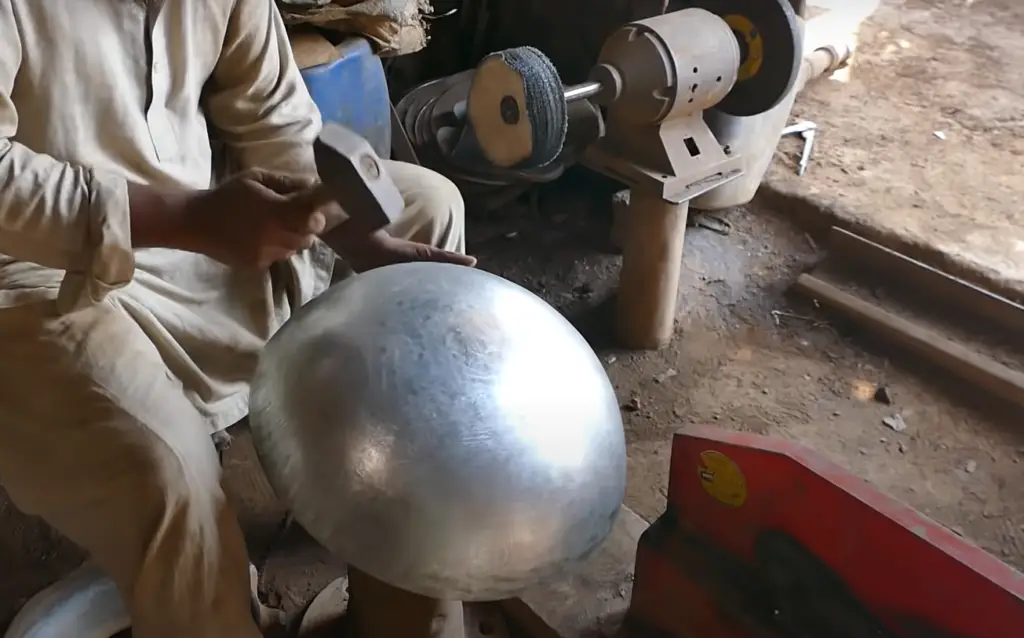
Depending on the purpose of use, these frying pans are divided into:
- Cake pans – it should have a smooth interior surface to prevent sticking;
- Baking sheets – these are flat with raised edges that provide stability during baking or roasting processes;
- Roasting pans – they are deeper than other aluminum pans and often come with lids to retain moisture when slow-cooking meats;
- Pie plates – they should have sloped sides and a shallow depth that allows for even heat distribution;
- Casserole dishes – these are versatile pans with deep walls and lids, which allow you to bake your favorite meals;
- Loaf pans – it should be made from heavy-gauge aluminum with a non-stick interior surface;
- Pizza pans – these pans are also made from aluminum and come in various sizes, depending on the size of the pizza you plan on baking. [3]
It’s important to note that all of the above types of aluminum pans must be oven safe in order to use them safely in an oven. They also must not contain any metal parts that could melt, such as steel handles or rivets. If there is any doubt about whether or not an aluminum pan is suitable for oven use, always check the manufacturer’s instructions before proceeding.
What to Consider When Choosing an Aluminum Pan?
When choosing an aluminum pan for use in the oven, there are a few factors that should be taken into consideration.
The first is the weight of the pan – heavier pans tend to absorb and retain heat better than lighter pans, so if you’re baking something like breads or cakes where even heating is key then a heavier option may be best. However, it is important to ensure that the pan is not too heavy as this can cause warping when heated.
The next factor to consider is the shape of the pan. For most types of baking, round pans work best as they allow for more even distribution of air flow and heat throughout. Square and rectangular pans tend to trap heat around their edges which can lead to burnt spots on your food.
Finally, it is important to make sure that the aluminum pan you are using is safe for oven use. Some pans may only be made for stovetop use and can leach dangerous chemicals into your food when heated in an oven.
Try to look for pieces made from heavy-gauge aluminum. Heavier gauge aluminum is more durable and better able to withstand high temperatures. [4]
Avoid thin, flimsy pans that can warp in the heat. Additionally, avoid non-stick surfaces as this coating can break down in a hot oven. Look for anodized aluminum when possible, as this type of material is designed to resist corrosion from exposure to high heat. The advantage of anodized aluminum is that it also helps to prevent food from sticking.
Make sure all handles are securely attached and oven-safe. Finally, check that your pans are labeled ‘oven safe’ —this will guarantee they do not melt or burn at higher temperatures. [5]
By taking all of these factors into consideration, you can ensure that you have chosen the best aluminum pan for baking in your oven. Not only will this help keep your food safe but it will also ensure optimal results for whatever delicious baked goods you’re making!
Advantages of Aluminum Pans
Aluminum pans are an inexpensive and convenient choice for cooking. They are lightweight, non-toxic, durable, and easy to clean. In addition, they have the ability to conduct heat quickly and evenly which can result in perfectly cooked food with a consistent texture. Not to mention, aluminum is also great at retaining flavor without adding any unwanted flavors or scents.
Other benefits are that aluminum pans may also be used in the oven, stovetop, or even on the grill. They are a great choice for roasting meats and vegetables as well as baking cakes and other desserts. With an aluminum pan, you can get creative with your cooking and easily clean up afterwards.
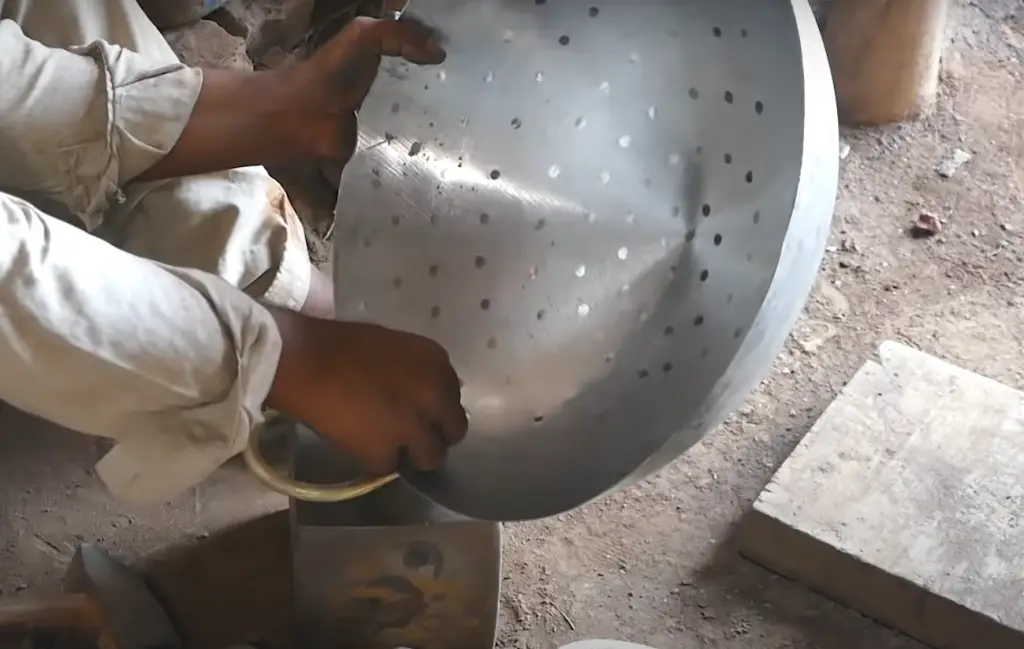
It’s suitable for use on all types of stove tops and will not rust, so you can use it for years to come. Plus, with its low price, you can equip your kitchen with a top-of-the-line pan without breaking the bank.
But what really sets professional aluminum pan apart is its safety. Manufacturers produce a pan of pure aluminum, which means you can use it with peace of mind knowing that it is not harmful to your health. Plus, its lightness also makes it easy to use – you can transfer it quickly and easily from one burner to another. [6]
So, if you’re looking for an affordable kitchen essential that will last a while, investing in quality aluminum cookware is definitely worth it.
Disadvantages of Aluminum Pans
Despite the huge number of advantages, pans made of this material still have drawbacks. Among them are the following:
- Aluminum is a soft metal, so it can be easily deformed. It does not withstand temperature drops well and therefore you should avoid sudden cooling of the pan;
- The aluminum reacts with acidic foods, which means that such pans are not suitable for cooking tomatoes or citrus fruits. In addition, they may become discolored and give an unpleasant taste to food prepared in them;
- A finished dish cooked in an aluminum pan may turn out to be dry as the metal quickly absorbs moisture from the food;
- Aluminum pans are easy to scratch, so they require careful and gentle handling. It is better not to use abrasive sponges for cleaning;
- It should be noted that such pans spread the heat unevenly, which affects the cooking process. Therefore, you should choose models with thicker walls or double bottom.
These disadvantages should be taken into account when choosing a pan made of this material and deciding whether aluminum pans are suitable for your needs. However, if used properly, aluminum can provide an excellent cooking experience! That’s why they remain among the most popular kitchen tools!
Recommendations for Using the Aluminum Pan in the Oven
When using an aluminum pan in the oven, it is important to take certain precautions. Here are a few tips for safely baking with your aluminum pans:
- Avoid sudden temperature changes – Allow the oven to preheat before adding your aluminum pan and avoid opening the oven door frequently during cooking. This will ensure that the heat stays consistent throughout the baking process and prevent cracks or warping of your pan due to thermal shock.
- Avoid high temperatures – While aluminum can be placed in a hot oven, it’s best to avoid excessively high temperatures as this can cause damage to the metal and even cause it to melt. For best results, use an aluminum pan at medium-low heat (320°F to 350°F is usually a safe range).
- Use appropriate cookware – Make sure the aluminum pan you are using is oven-safe. Many disposable pans or baking sheets may not be designed for direct contact with heat and should only be used on the upper racks of your oven.
- Grease appropriately – When baking, grease the inside surfaces of your aluminum pan lightly to prevent sticking during cooking. This will also make it easier to clean afterwards as food residue won’t stick too firmly to the surface.
- Take care when handling – Aluminum conducts heat quickly, so use caution when removing it from the oven. Wear oven mitts and provide protection against steam coming off hot foods.
- Allow to cool before cleaning – Once you’ve finished baking, allow your aluminum pan to fully cool before washing it. This will help preserve its integrity and prevent warping or damage.
- Don’t forget your rack – Always use a baking rack to keep your aluminum pan elevated from direct contact with the oven floor. This will help disperse heat evenly and prevent scorching of your food. [8]
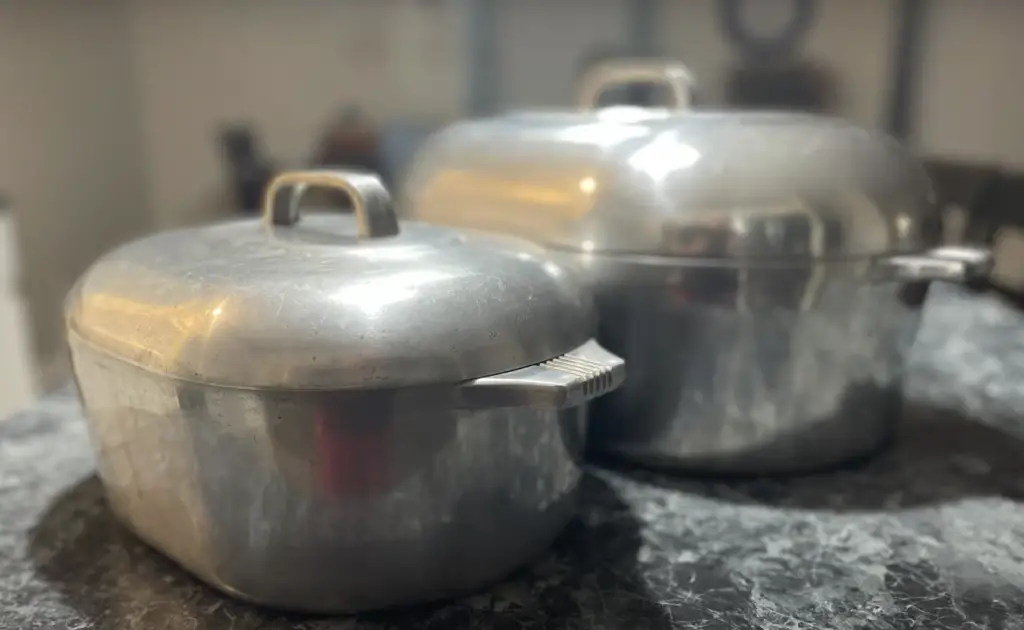
By following these simple precautions, you can safely use aluminum pans in the oven and enjoy perfectly cooked food every time.
Is It Safe to Put an Aluminum Pan in the Oven?
The short answer is yes, you can put aluminum pans in the oven. Aluminum is a highly conductive metal that is capable of withstanding high temperatures and transferring heat evenly throughout whatever it contains. Since much of our cookware these days is made from aluminum, it’s safe to say that most baking pans are already suitable for use in the oven.
That said, there are a few things to consider before putting an aluminum pan in the oven. For one thing, not all aluminum pans are created equal; different varieties may be better suited to certain temperatures than others. Additionally, care should be taken when transferring hot items from the stovetop or microwave directly into an aluminum pan; too sudden a temperature change can warp or damage the pan. [9]
In conclusion, an aluminum pan is generally a safe vessel for oven use. However, as with any cooking method, it’s important to keep in mind that certain precautions must be taken to ensure safety and optimal results.
Do Aluminum Pans Melt in the Oven?
It is possible for aluminum pans to melt in the oven, though it requires extreme temperatures of over 675 degrees Fahrenheit. At such high temperatures, the aluminum will begin to soften and even melt if exposed for a long enough period.
It is important to note that most conventional ovens only reach temperatures of up to 500 degrees Fahrenheit, meaning that aluminum pans are generally safe to use in these types of ovens. However, it’s best not to use an aluminum pan if the temperature exceeds 500 degrees Fahrenheit or if you plan on cooking for an extended period of time. [10]
If you still decide to use an aluminum pan in such conditions, be sure you’re monitoring it closely as any slight changes could cause softening or melting of the material.
What to Cook in Aluminum Pans?
Cooking in aluminum pans is a great option when you need to bake, roast or heat up something quickly. Many foods can be cooked in aluminum pans, such as meats, casseroles and desserts. Due to its excellent heat conductivity, aluminum is a suitable material for dishes that need consistent temperature during cooking.
Baked fish, roasted vegetables and other items that don’t have particularly high moisture content are ideal for baking in aluminum pans. Foods with sauces like lasagna can work too but because they contain more moisture you may want to line the bottom of the pan with parchment paper first to prevent sticking.
Aluminum foil is a popular choice for wrapping around food items before placing them into the oven – this allows the food to steam and stay moist while cooking. This is particularly useful for fish, poultry and other delicate items.
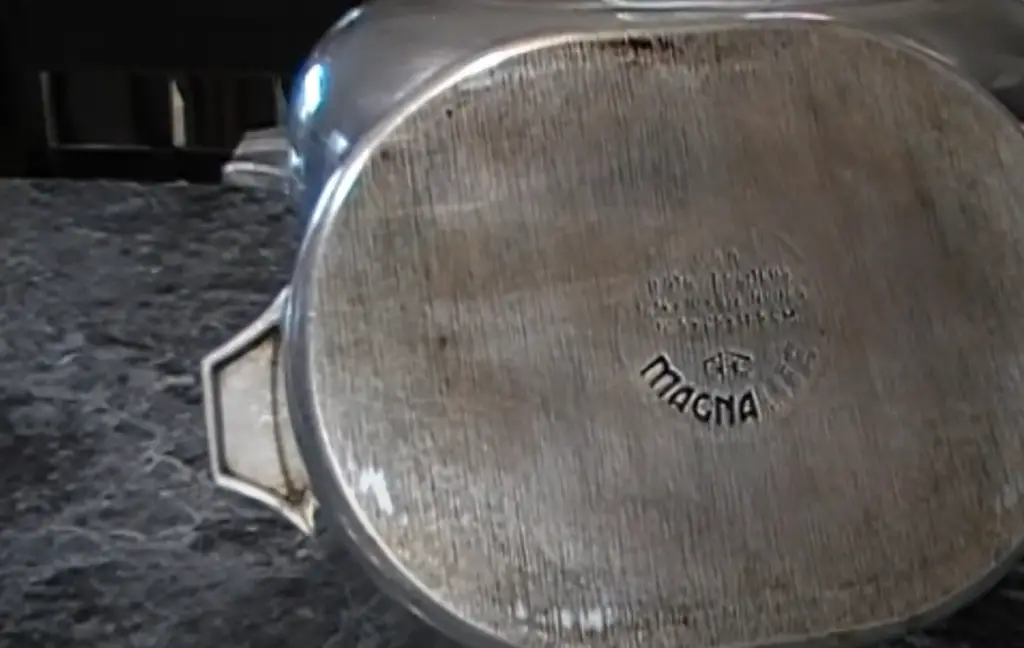
Aluminum pans are great for making cakes as they conduct heat evenly and produce a light crust on their surface. Baking pies in aluminum pans works well too – just make sure to grease the sides of the pan so that the pastry won’t stick when it’s finished baking.
Plus, these pans are lightweight and easy to clean, making them a great choice for busy cooks. Just try them and you will understand everything!
How to Properly Care for Aluminum Pans?
Aluminum pans are a great option for baking in the oven. However, if you want them to stay in their best condition, it’s important to take proper care of them. Here are a few tips for making sure your aluminum cookware stays safe and lasts a long time:
- Clean Your Pans Thoroughly – After every use, make sure you wash your aluminum pans with hot soapy water and dry them thoroughly before putting them away. This will help prevent any build up of food particles from sticking to the surface and causing damage over time.
- Avoid Abrasive Cleaners – While it’s important to clean your aluminum pans regularly, try to avoid using any kind of abrasive cleaners as these can dull the surface of the pan over time. Stick with non-abrasive sponges or cloths when cleaning your aluminum cookware for best results.
- Use Silicone-Baked Liners – If you’re baking something particularly sticky like cake batter, line your pan with a silicone baking sheet before pouring in the mixture. This will help prevent sticking and save you from having to scrub off stuck on food later.
- Don’t Store with Other Pans – When storing your aluminum cookware, make sure you keep it separate from other pans and utensils. Aluminum can react with other metals and cause discoloration or pitting of the surface.
- When cleaning, stay away from metal scrubbers – Due to the softness of aluminum, it’s important to remember that you should never use a metal scrubber or brush when cleaning them. This will scratch and damage the surface. Instead, opt for a sponge or cloth so your pans last longer. [11]
FAQs
What is the trick to cooking with aluminum pans?
When cooking with aluminum pans, it is important to remember that the pan will heat up quickly and should be monitored closely. It is also important to avoid putting the pans directly over open flames as this can cause them to warp or melt.
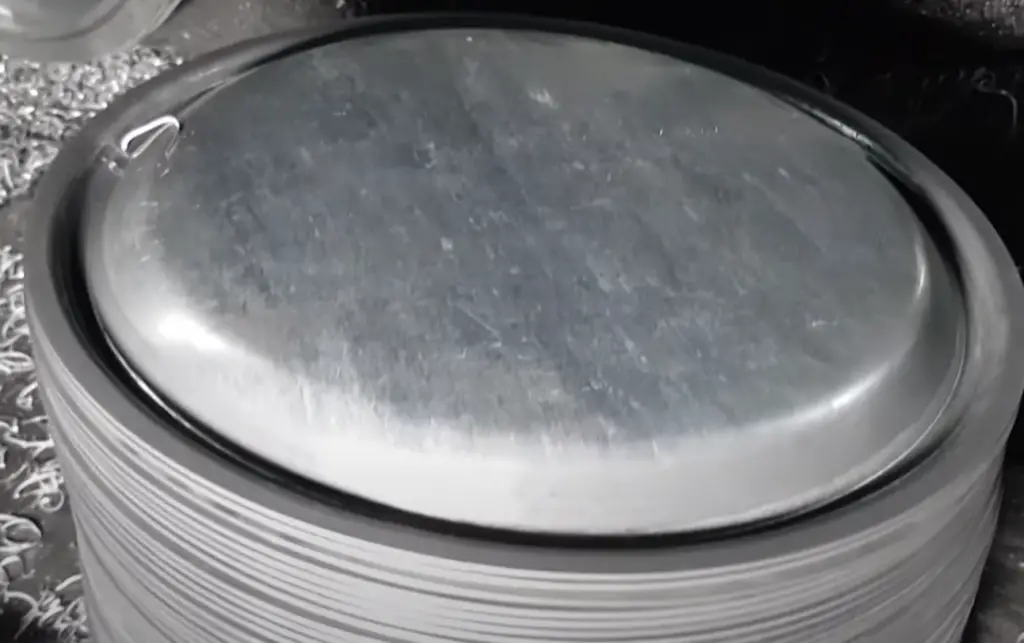
Additionally, it is best to preheat the oven before placing aluminum pans in it in order to ensure even cooking.
Can you put aluminum pans in the oven?
Yes, you can safely place aluminum pans in the oven. Aluminum is an excellent heat conductor and is often used in baking pans or foil wraps to help distribute heat evenly during cooking.
Can you put aluminum pans on a stovetop?
Yes, but when heating any type of cookware on a stovetop burner, the heat should never exceed medium-high setting. Also, burning oils can cause residue build up on aluminum cookware, so it’s important to avoid over-heating or burning the oil. Finally, never leave an empty aluminum pan on a hot stovetop burner as this may cause warping of the pan.
How do you use an aluminum tray in the oven?
When using an aluminum tray in the oven, it’s important to preheat the oven first and then place a sheet of parchment paper or foil on the tray before adding food. When finished baking, let the tray cool on a wire rack for 10-15 minutes before attempting to remove the food.
Useful Video: Can you put an aluminum pan in the oven?
Summing Up
In conclusion, aluminum frying pans are an optimal choice for long-lasting cookware that is Eco-friendly and flexible to use. From deep or shallow frying on the stovetop to baking in the oven with non-stick results, aluminum fry pans can do it all safely. Taking proper care of your aluminum cooking pieces is necessary to ensure their longevity of lasting performance and safety. Make sure to regularly clean them with non-abrasive materials and prevent excessive preheat times for optimal efficiency. Aluminum frying pans are a valuable, affordable, and versatile investment for making delicious meals safely – so why wait? Get yourself one today!
References:
- https://www.cnpococina.com/news/why-use-aluminum-utensils-in-your-kitchen.html
- https://www.cnpococina.com/news/major-types-of-aluminum-cookware.html
- https://www.craftsycakes.com/types-of-baking-pans/
- https://apreldevelopment.com/kitchen/key-factors-consider-buying-cooking-pan
- https://www.beka-cookware.com/en-gb/inspiration/blog/how-to-choose-the-pan-thats-right-for-you
- https://cosmiccookware.com.au/blogs/news/aluminum-vs-stainless-steel-cookware
- https://www.cnpococina.com/news/three-advantages-and-disadvantages-of-aluminum-cookware-set.html
- https://eatpallet.com/can-you-put-an-aluminum-pan-in-the-oven/
- https://www.fanaticallyfood.com/can-aluminum-pans-go-in-the-oven/
- https://www.dominatekitchen.com/can-you-put-an-aluminum-pan-in-the-oven/
- https://texrestaurantsupply.com/news/157-important-guide-on-cleaning-aluminum-cookware

